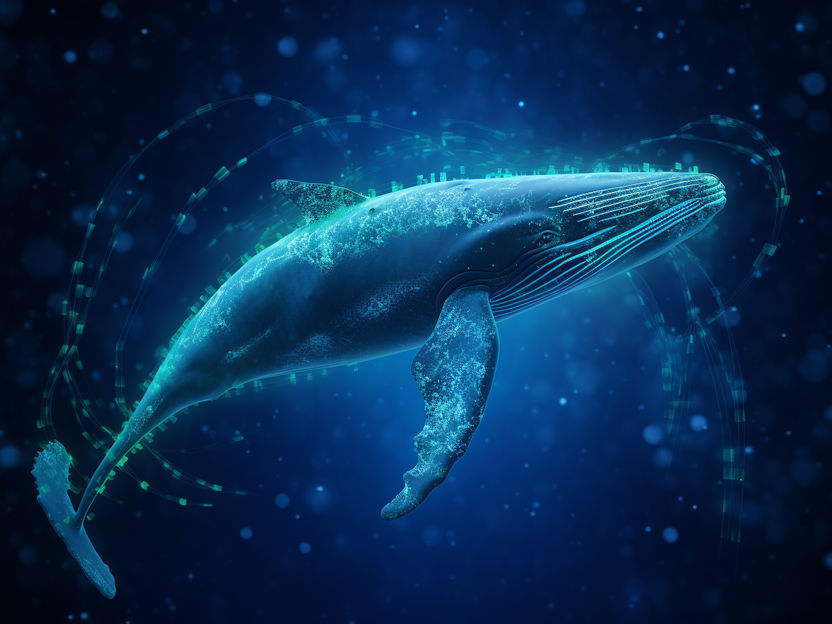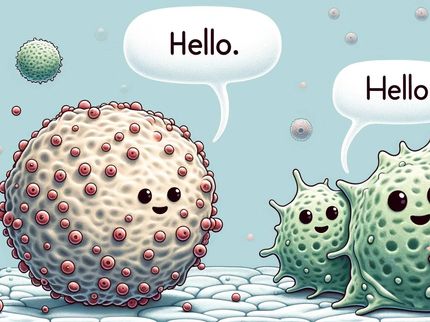Genome of the pygmy right whale holds great potential for cancer research
The genome of the smallest baleen whale provides insight into evolution and tumor resistance
The pygmy right whale (Caperea marginata) is the smallest of all baleen whales although it can grow to six metres in length and weigh up to three tons. The species occurs circumpolar in the Antarctic waters of the Southern Hemisphere, and only a handful of sightings have been reported thus far. It is considered to be the last surviving member of an otherwise extinct branch of baleen whales and has received little to no attention from the scientific community. However, its genetic material could provide interesting information for cancer research, as a team of scientists from Frankfurt and Lund, Sweden, has now discovered. Their study on the evolution and tumor resistance of baleen whales was recently published in the journal BMC Biology.

Symbolic image
Computer-generated image
With their huge bodies, whales should be predestined for tumor diseases. The more cells you have, the greater is the chance that one of your cells will contract a mutation at a critical point in the genome, leading to tumor development. Contrary to their size and cell numbers, the giant whales seem to have an unusually low risk of cancer. This phenomenon of oncology and statistics, named after its discoverer Richard Peto, is also known as "Peto's paradox". How this resistance works at the genetic level is still unknown, but deciphering it holds great potential for cancer research.
To unravel this mystery, researchers from the Senckenberg Biodiversity and Climate Research Centre (SBiK-F), the Hessian LOEWE Centre for Translational Biodiversity Genomics (TBG) and the Universities of Frankfurt am Main and Lund, Sweden, analysed the genome of the pygmy right whale. Using modern methods of genomics, bioinformatics, phylogenomics and selection research, they discovered numerous genes that have significantly more mutations in large whales, such as the blue whale, fin whale or bowhead whale, than in the small pygmy right whale.
While genetic mutations are generally considered harmful, a high number of mutations within a gene is usually associated with a positive effect for the species. According to the researchers, the results suggest that these "positively selected" genes may play a special role in whale cancer resistance. "Our new findings demonstrate that almost every large cetacean species seems to have other positively selected genes in their genome. This could be explained by an idea already discussed in paleontology, namely that the iconic gigantism of whales has evolved several times independently," explains Magnus Wolf, researcher at the SBiK-F and Goethe University in Frankfurt, first author of the study. "This means that each larger whale may have its own adaptations against tumor that we could one day use." In fact, most of the genes identified by the team are already known in tumor research but have not yet been extensively studied. Whale genomes could therefore provide useful information for medical research in the future.
In their study, the scientists were also able to decipher the relationships within baleen whales such as grey whales, right whales and rorquals, more precisely than before. They identified a point in the evolution of the rorquals where their common ancestor split into three lineages at the same time. These results also show that genetic exchange between the ancestors of today's species was still possible for a long time.
"Our study is exactly in line with the motto of the LOEWE Centre TBG: 'Document – Protect – Use'. Genomic data is the basis for understanding biodiversity and contributes to precise conservation efforts. At the same time, these findings are valuable for medicine in an application-related perspective," explains study leader Prof. Dr. Axel Janke, also a scientist at SBiK-F and Frankfurt University, who helped establish and lead the Hessian LOEWE Centre of Excellence TBG and has been its spokesperson for six years.
However, the research and medical potential of biodiversity genomics is at risk of being lost with the loss of biodiversity, Janke says. "Even though baleen whales are now strictly protected, and their populations seem to be recovering, there are still traces of their former hunting within their genomes, such as a certain loss of genetic diversity – with possible long-term consequences for these whales. Therefore, a precise genomic monitoring is important," Janke emphasizes.

























































